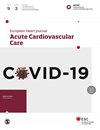Microvascular dysfunction associated with reduced nailfold capillary density in patients with ischemia with no obstructive coronary artery disease
IF 4.6
2区 医学
Q1 CARDIAC & CARDIOVASCULAR SYSTEMS
European Heart Journal: Acute Cardiovascular Care
Pub Date : 2024-05-09
DOI:10.1093/ehjacc/zuae036.185
引用次数: 0
Abstract
Funding Acknowledgements None. Introduction The impairment of microvascular function present in coronary microcirculation with chronic angina without obstructive coronary arteries. There are insufficient data in the literature regarding possible generalized microangiopathy in this population. Aim The aim of this study is to demonstrate whether patients with Angina with No Obstructive Coronary Artery Disease (ANOCA) compared to individuals without coronary microvascular dysfunction (CMD) are characterized by a different level of nailfold capillaroscopy abnormalities. Methods We examined 18 participants without CMD - non-CMD group [9 female, 50%, mean age: 54.4±8.1 years) and 26 patients with ANOCA - CMD group (22 female, 84,6%, mean age : 53.2±10.7 years). Functional coronary angiography was performed for the assessment of coronary microcirculation in all patients. Coronary flow reserve (CFR) and index of microvascular resistance (IMR) were measured in the left anterior descending coronary artery using a temperature/pressure sensor-tipped guidewire. In addition, the assessment of skin microcirculation was performed by capillaroscopy, a non-invasive technique to evaluate small vessels of the microcirculation in the nailfold, using stereomicroscope in all patients. Results In CMD group, mean CFR and IMR were 1.34±0.6 and 44.8±28, respectively. Out of the 26 MVD patients with abnormal CFR, 7 of them (27%) had a normal value of IMR, indicating functional microvascular dysfunction. On the other hand, 18 patients (69%) had an abnormal IMR, indicating structural microvascular dysfunction. Capillary density in patients with MVD was significantly decreased compared to the control group (7.6±2.2 vs 10.9±1.8 vessels/mm, p=0.04). The difference in capillary density between the two groups was statistically significant after adjustment for multiple comparisons (p<0.05). No significant difference was found in body mass index, renal function, medical history of dyslipidemia, diabetes mellitus and smoking status between the two groups (p<0.05). Conclusion Nailfold capillary density was reduced in ANOCA patients compared to control group. These data may provide new insights regarding possible generalized microangiopathy in CMD patients. These results suggest that there is an association between microcirculatory impairment at both heart and peripheral vascular bed level.微血管功能障碍与无阻塞性冠状动脉疾病的缺血患者甲襞毛细血管密度降低有关
无。导言:无冠状动脉阻塞的慢性心绞痛患者的冠状动脉微循环存在微血管功能损害。关于该人群中可能存在的全身性微血管病变,文献资料不足。目的 本研究旨在证明无阻塞性冠状动脉疾病(ANOCA)心绞痛患者与无冠状动脉微血管功能障碍(CMD)患者相比,是否具有不同程度的甲皱毛细血管镜检查异常。方法 我们对 18 名无冠状动脉微血管病变患者--非冠状动脉微血管病变组(9 名女性,50%,平均年龄:54.4±8.1 岁)和 26 名无冠状动脉微血管病变患者--冠状动脉微血管病变组(22 名女性,84.6%,平均年龄:53.2±10.7 岁)进行了检查。所有患者均进行了功能性冠状动脉造影,以评估冠状动脉微循环。使用温度/压力传感器尖端导丝测量冠状动脉左前降支的冠状动脉血流储备(CFR)和微血管阻力指数(IMR)。此外,所有患者的皮肤微循环评估都是通过毛细血管镜进行的,毛细血管镜是一种无创技术,用于评估甲襞微循环中的小血管。结果 CMD 组的平均 CFR 和 IMR 分别为(1.34±0.6)和(44.8±28)。在 26 例 CFR 异常的 MVD 患者中,有 7 例(27%)的 IMR 值正常,表明微血管功能障碍。另一方面,18 名患者(69%)的 IMR 值异常,表明微血管结构功能障碍。与对照组相比,MVD 患者的毛细血管密度明显降低(7.6±2.2 vs 10.9±1.8血管/毫米,P=0.04)。经多重比较调整后,两组之间毛细血管密度的差异具有统计学意义(p<0.05)。两组之间在体重指数、肾功能、血脂异常病史、糖尿病和吸烟状况方面无明显差异(p<0.05)。结论 与对照组相比,ANOCA 患者的甲皱毛细血管密度降低。这些数据可能会对 CMD 患者可能存在的全身微血管病变提供新的见解。这些结果表明,心脏和外周血管床水平的微循环障碍之间存在关联。
本文章由计算机程序翻译,如有差异,请以英文原文为准。
求助全文
约1分钟内获得全文
求助全文
来源期刊

European Heart Journal: Acute Cardiovascular Care
Medicine-General Medicine
CiteScore
8.50
自引率
4.90%
发文量
325
期刊介绍:
The European Heart Journal - Acute Cardiovascular Care (EHJ-ACVC) offers a unique integrative approach by combining the expertise of the different sub specialties of cardiology, emergency and intensive care medicine in the management of patients with acute cardiovascular syndromes.
Reading through the journal, cardiologists and all other healthcare professionals can access continuous updates that may help them to improve the quality of care and the outcome for patients with acute cardiovascular diseases.
 求助内容:
求助内容: 应助结果提醒方式:
应助结果提醒方式:


